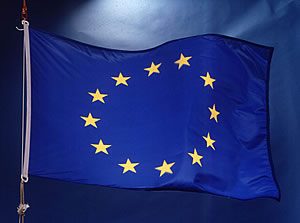The eurpea union:

Continent: Europe
Real: Yes
The European Union (EU) is a political community of law are under a sui generis international organization, created to encourage and accommodate the integration and common governance of the peoples and states of Europe. It consists of twenty-seven European states and was established with the entry into force of the Treaty on European Union (TEU), November 1, 1993.6
If at first the superstructure "European Union" and was based on aunaba three existing European Communities (ECSC, Euratom and the EEC / EC) under the complex system known as the "three pillars"-the aforementioned communities with foreign policy common police and judicial cooperation, with the entry into force on December 1, 2009, the Treaty of Lisbon, the European Union fully happened European communities, although with certain qualifications, and took with it its legal only as a subject of law internacional.7
The European Union has developed a legal and political system, the European Community, unique in the world that is governed by mechanisms and complex internal operating procedures, which have expanded and evolved throughout its history to conform, at present , a hybrid system of transnational governance that combines elements homologous hardly close to multilateral cooperation, although highly structured and institutionalized, with other supranational vocation purely governed both by a regional integration dynamic too steep.
All this leads to a very peculiar community of law, legal and political nature of which is controversial, although its foundational elements and its historical evolution, still open, point, today, a special form of confederation or supranational governance modern, sharply institutionalized and historical inspiration federal policy calling-in the sense of a new international federalism, not a classical federal state is detected with some clarity in areas such as citizenship, the principles of supremacy and direct effect that apply its law relating to national law, the judicial system or monetary union (the euro system).
The European Union, and before the community, promote continental integration through common policies covering different policy areas, essentially economic in origin and progressively extended to areas undoubtedly políticos.8 To achieve their common goals, the states of the Union attributed to this particular competition, holds a common or shared sovereignty that is deployed through community channels.
The European Union is governed by an internal system of democracy regime representativa.9 Its institutions are seven: the European Parliament, the European Council, the Council, the European Commission, the Court of Justice of the European Union, the Court of Auditors and European Central Bank. The European Council exercises general policy guidance functions and external representation, and appoints the heads of the highest constitutional institutions, Parliament and the Council exercise the legislative power on equal terms, taking joint decisions, with the exception of legislative procedures special, where the Parliament has a purely consultative role-, 10 11 The Commission or applied College Union law, monitors compliance and implements its policies, and accounts for the exclusive legislative initiative to the Parliament and the Commission; 11 the Court exercises the supreme judicial work in the Community legal system, the Court of Auditors monitors and controls the proper functioning and administration of finance and EU funds, and manages the European Central Bank implements monetary policy and euro area's unique.
The Union also has other bodies, institutions and bodies of various functions and powers, such as the Economic and Social Committee of the Regions, European Ombudsman, the High Representative of the Union for Foreign Affairs and Security Policy and others.
The Union territory includes all of its states.

